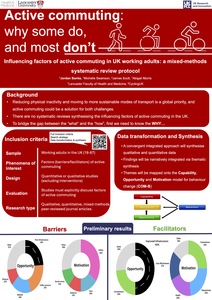Banks, Jordan and Swainson, Michelle and Scott, James and Morris, Abigail (2025) Influencing Factors of Active Commuting in UK Working Adults: A Mixed-Methods Systematic Review Protocol. In: CASES Physical Activity for Health Division Day, 2025-06-02 - 2025-06-02, Alexander Stadium. (Unpublished)
Symposium_poster_JPEG.jpg
Available under License Unspecified.
Download (1MB) | Preview
Abstract
Background Active commuting (AC) has a range of health, environmental, economic and societal co-benefits. In the UK, 68% of adults commute by car, however, some of these trips could be feasibly swapped with AC. Understanding the barriers and facilitators of AC can aid the development of appropriate AC interventions. However, there are no systematic reviews that investigate the factors that influence AC in UK adults. This systematic review will synthesise the available academic evidence of the influencing factors of AC in the UK, contextualised using the Capability, Opportunity and Motivation (COM-B) model for behaviour change. Methods A mixed-methods convergent integrated systematic review will be conducted to combine both quantitative and qualitative data which will ensure all available evidence will be included when answering the review question. Twenty-six studies that included data on the influencing factors of AC in UK adults were identified through searches of five databases. Quantitative and qualitative data will be integrated using thematic synthesis and systematically mapped onto the COM-B model. Results Preliminary results found that in terms of the COM-B model, barriers were related to “physical opportunity” (e.g. poor infrastructure and traffic concerns) and “reflective motivation” (e.g. safety, time, distance and social norms). Facilitators were focused on “physical opportunity” (e.g. improved infrastructure) and “reflective motivation” (e.g. convenience, pleasantness, cost-effectiveness and health). Discussion Identifying modifiable and non-modifiable barriers and facilitators through a behavioural science lens may allow the development of targeted and theoretically informed approaches, which may encourage an increase in AC uptake in UK working adults.
![[thumbnail of Symposium poster JPEG]](https://eprints.lancs.ac.uk/230047/1.hassmallThumbnailVersion/Symposium_poster_JPEG.jpg)
